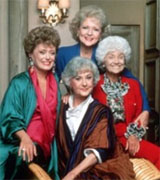May 31, 2005
TV ON DVDThe Golden Girls: Season One
Thank you for being a friend
Travel down the road and back again
Your heart is true; you're a pal and a confidante
And if you threw a party
Invited everyone you knew
You would see the biggest gift would be from me
And the card attached would say "Thank you for being a friend"
OK, 'fess up: You can envision the whole credit sequence in your head. You know the difference between the "long" and "short" credit sequences when Lifetime shows the episodes, and you prefer the long. The short doesn't have that cool coordinated "ba-da DUM DUM DUM" moment after "you're a pal and a confidante."
Oh, don't act like you don't know what I'm talking about. That perfectly choreographed editing job, with each "DUM" punctuated by a great Dorothy gesture:
- First "DUM" — Dorothy flinging her hands in the air
- Second "DUM" — Dorothy strangling Rose
- Third "DUM" — Dorothy squeezing Blanche's hand, forcing Blanche down in pain
 |
Eat my cheesecake.
All shilling aside, sitting down to watch these episodes is like a day spent watching Lifetime ("Television for Homos"), and with good reason — until the endless reruns of The Nanny came along, Bea, Betty, Rue and Estelle were the main women of comedy on the fledgling cable network. I would spend many a fond hour watching the Holiday Weekend Golden Girls Marathons, taping some of my favorite episodes to watch over and over and over again.
But I digress.
As with many older series released on DVD, The Golden Girls is a somewhat mixed bag. True, all the jokes are there just as you remembered them — but so is the original broadcast quality, which wasn't always the best. And — as I found when I played through my Season One Diff'rent Strokes DVDs — a lot of the humor was dated. Oh, so dated. More dated than Blanche, even.
But wardrobe and references to Miami Vice aside, The Golden Girls was still a landmark comedy, a show that put a group of women together (somewhere between "district attorney" and "Driving Miss Daisy") and explored their lives, loves and one-liners with glee. The dialogue was often edgier than other comedy fare — the biggest hit at the time was The Cosby Show — and there was a smart sensibility running throughout the show that its spin-offs (Empty Nest and Nurses, ignoring the awful The Golden Palace) couldn't duplicate.
That the show was so edgy is a tribute to the four actresses at the show's heart. Bea Arthur had made a television name for herself with the equally smart Maude, playing the thrice-divorced outspoken liberal Maude Findlay. Rue had appeared on Maude with Bea, playing the not-unlike-Rose character of Vivian Cavender-Harmon. Betty White was familiar to fans of The Mary Tyler Moore Show as the man-eating Sue Ann Nivens — a role not unlike Blanche -— and Betty and Rue had worked together on Mama's Family for two years. Estelle Getty, known more in the world of the theater, rounded out the cast playing the oldest of the lot, although she was in fact younger than Bea. (Betty was the oldest of the cast, followed by Bea, Estelle and Rue.) It is of course part of the show's lore that Betty was supposed to be Blanche and Rue Rose; they switched at the last minute to avoid typecasting. (Of course, they then were typecast in completely different positions, with Betty still trying desperately to break herself of that image as she plays foul-mouthed harridans again and again and again.)
The four central women were gifted actresses with impeccable comic timing and a sense for physical comedy well. Up until that point, there hadn't been an outlet on TV for funny post-menopausal women (and, truth be told, there still isn't). While the show is especially notable in this regard, that isn't what drew me as a fan.
| I might not have understood all the jokes and risque references, but by golly, I liked those smart-talking women and their zany antics. |
The Golden Girls has developed a camp quality — partially for its wardrobe, partially for its Bette Davis/Mae West-esque one-liners, partially for its cast. And the Season One DVDs put a lot of that camp quality on display early on, allowing even a casual viewer to pick up on some of the not-so-subtle subtext. Four women living together, and the main character is a tall, gravelly-voiced woman with huge shoulder pads? Rawr!
For more Golden Girls SMRT-ness: D. Roberts Keenan has recorded a
podcast commentary on the pilot episode of The Golden Girls. If
you don't own the DVDs, may we suggest Netflix?
Email the author.
All written content © 2005 by the authors. For more information, contact homer@smrt-tv.com
